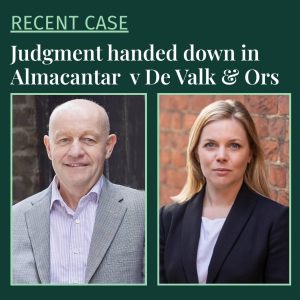
External Conferences
PLA Autumn Training Day 2025
Wednesday 12 November
The Royal Society of Medicine, London
Speakers:
Tiffany Scott KC | Benjamin Faulkner
PropertyWednesday 4 June 2025
The Supreme Court handed down judgment today in Waller-Edwards v One Savings Bank plc, providing clarification about the circumstances in which a bank is “put on inquiry” that a mortgage has been procured by undue influence. Where a lender is put on inquiry, the lending and any associated mortgage may be set aside unless the bank can show that steps have been taken to ensure that the borrower is aware of the nature of the transaction and has received legal advice on it.
In the well-known cases of Barclays Bank v O’Brien [1994] 1 AC 180, CIBC Mortgages plc v Pitt [1994] AC 200 and Royal Bank of Scotland plc v Etridge (No 2) [2002] 2 AC 773, the House of Lords considered cases in which it was alleged that a person had entered into a loan for the benefit of their spouse (or other person with whom they were not in a commercial relationship) as a consequence of undue influence or misrepresentation. They held that the lender would be put on inquiry where it appeared to the lender that the loan was not for the benefit of the person who was subject to the undue influence or misrepresentation, i.e. they were acting in substance as a surety or guarantor. On the other hand, where the loan appeared to the lender to be joint borrowing for the benefit of both spouses, the lender would not be put on inquiry.
Ms Waller-Edwards was found by the County Court judge to have entered into a £384,000 remortgage transaction with One Savings Bank plc as a consequence of the undue influence of her partner, Mr Bishop. The bank understood that the loan was to be used for the purchase of another property for the couple and to pay off an existing mortgage debt. As a condition of the lending, it required Mr Bishop’s car loan of £25,000 and credit card debts of £14,500 to be paid off. Consequently, from the perspective of the bank the lending was a hybrid transaction: it was partly for the joint purposes of Ms Waller-Edwards and Mr Bishop but about 10% of the lending was for Mr Bishop’s sole purpose. In fact, unknown to the bank, after paying off the first charge, Mr Bishop used the loan to make a payment to his ex-wife.
The County Court held that the bank was not put on inquiry by the fact that an element of the loan was understood to be used to pay off debts in Mr Bishop’s sole name. This was upheld in the High Court and Court of Appeal. The Supreme Court, however, allowed Ms Waller-Edwards’ appeal. It held that a creditor is put on inquiry in any non-commercial hybrid transaction where, on the face of the transaction, there is more than a trivial element of borrowing which serves to discharge the debts of one of the borrowers and so might not be to the financial advantage of the other.
Joanne Wicks KC was instructed by David Prideaux of Solaris Law and appeared with Antonia Halker of Lamb Chambers for the bank.

People to view:

External Conferences
Wednesday 12 November
The Royal Society of Medicine, London
Speakers:
Tiffany Scott KC | Benjamin Faulkner

Recent Cases
Property
Martin Hutchings KC | Harriet Holmes
Friday 26 September 2025

Recent Cases
Property, Commercial disputes
Alice Hawker
Monday 15 September 2025

External Conferences
Wednesday 8 October 2025
Mishcon de Reya, London
Speakers:
Joanne Wicks KC